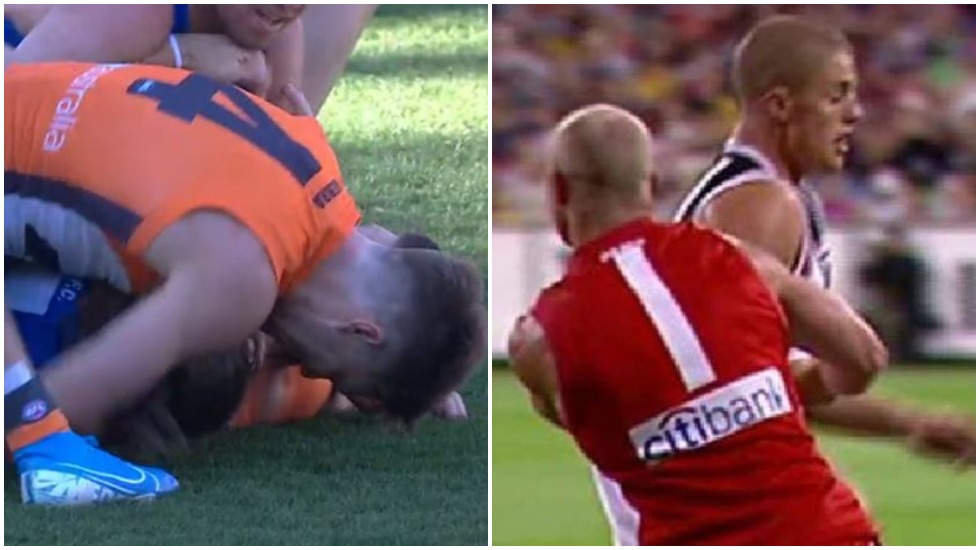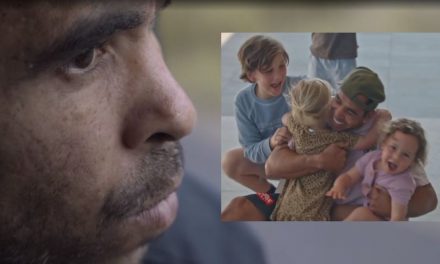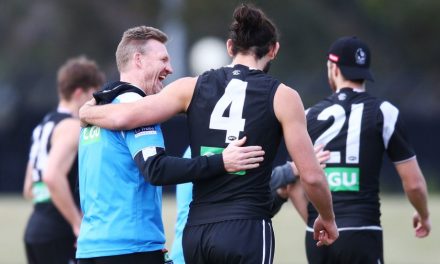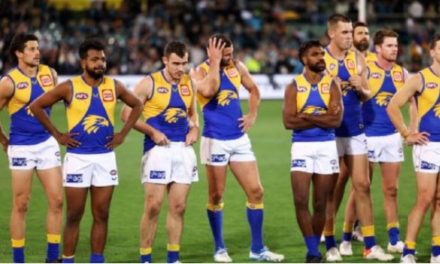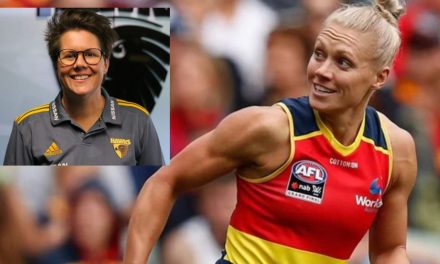Toby Greene’s incident with Marcus Bontempelli (left) and Barry Hall’s strike on St Kilda’s Matt Maguire. Pictures: CHANNEL 7
During the AFL finals tribunal dramas take on a sharper edge. There are countless occasions of heartbroken players forced to miss the most important games of their club’s season because of on-field indiscretions.
Toby Greene, who on Thursday evening failed in an attempt to have his one-game suspension overturned by the AFL appeals board in a bid to play for Greater Western Sydney in Saturday’s preliminary final against Collingwood, is but the latest example.
Tales of players fighting for their spots in potential premiership sides against the threat of suspension are legion.
There was the famous case of Essendon legend John Coleman in 1951, nearly 70 years ago now, his controversial suspension for an entire finals series probably costing the Bombers a premiership. Richmond captain Neville Crowe famously missed out on holding aloft the Tigers’ first premiership cup for 24 years in 1967 after some staging from Carlton opponent John Nicholls.
In the 1980s, Carlton’s Bernie Evans and Hawthorn’s Peter Schwab missed out on premiership medallions after finals suspensions, and similar penalties proved fatal to two consecutive Collingwood flag tilts earlier this century, when key defender Jason Cloke was rubbed out in 2002, and key forward Anthony Rocca in 2003.
But even then, the tribunal – whilst eliciting little sympathy – was never accused of being compromised. In fact, the judiciary’s independence from the league administration was continually emphasised.
The big difference these days is the extent to which much of the football world simply assumes the decisions are in fact being manufactured by the controlling body, either through Match Review Officer Michael Christian, or the tribunal.
The shenanigans surrounding Greene’s two reports and penalties out of his past two games have pushed that level of cynicism to a new peak. And that’s entirely understandable.
Not only is the AFL judiciary proving wildly inconsistent again, it’s being further tarnished by the continual hints of interference and managed outcomes. And whether those assumptions are correct or not, that perception is a rod the league has made for its own back.
In matters of on-field discipline, you could trace the deepening of suspicions back to 2005, when Sydney co-captain Barry Hall, despite belting St Kilda’s Matt Maguire 50 metres away from play, was somehow able to have a one-game suspension overturned.
“I shouldn’t have played. If rules are rules, I shouldn’t have played the grand final,” Hall conceded when he was inducted into the Australian football Hall Of Fame two years ago. “I hit a guy. The rules were ‘in play, out of play’, (but) he was clearly out of the game. I got away with one.”
So, many felt, did the AFL, which knew it had a very romantic grand final story looming in the Swans, who, including their time as South Melbourne, hadn’t won a premiership for 72 years.
The current saga involving Greene has a lot more factors at play than just romance. There’s the still-strong public view that Greene’s Greater Western Sydney is, for all intents and purposes, a branch office of the AFL.
There’s the now-entrenched belief in the football community that there are “September discounts” on offer for players who fall foul of officialdom during finals games.
Romance? Well, the popular view is that while a couple of weeks ago the AFL might have been cheering on the Giants’ finals campaign, it now has the far bigger attraction of a prospective Richmond-Collingwood grand final, hence conflicting priorities.
Even without the conspiracy theories, the handling of Greene’s last couple of weeks has been a complete stuff-up.
Greene’s effort on the Western Bulldogs’ Marcus Bontempelli in the elimination final was grubby stuff. Totally unnecessary, and at the bottom of a pack well after play had stopped. Few on-field acts in recent years have transgressed the spirit of the game (or the “optics” the AFL is so conscious of) than that one.
MRO man Christian deemed it “serious misconduct”, over and above classifiable offences “unreasonable or unnecessary contact to the eye region or face” and it was thus referred directly to the tribunal. As well as the suspected eye gouging, there was the pulling of Bontempelli’s hair and ramming of his head into the ground.
At the tribunal, a contrite Greene threw himself at the mercy of the “court” and apologised to Bontempelli. But curiously, the AFL counsel never broached even the possibility that Greene had raked his fingers across the Bulldog player’s eyes. The prosecution even sought a lesser fine than that eventually imposed by the tribunal, which was $7500.
Perhaps the AFL underestimated the level of public discontent with that soft outcome. Perhaps Christian, having by implication expected the tribunal to back him up and instead seeing Greene slapped with a soggy lettuce leaf, decided to take care of the next one himself.
But whatever the rationale, the subsequent one-match penalty Greene was dealt by the MRO for another unnecessary bottom-of-the-back swipe on Brisbane’s Lachie Neale didn’t tally with the previous week’s fine.
No one who saw either incident could possibly claim the vision of the Neale incident was as incriminating, or serious-looking as the Bontempelli one. Yet the bottom line was a grading of “unreasonable or unnecessary contact to the eye region”, less damaging than “serious misconduct”, earned a suspension where the latter eventually did not.
If the tribunal fined Greene for Bontempelli, it surely had to downgrade the suspension to a fine for the lesser swipe at Neale. But it didn’t. And in the process chose to effectively ignore the testimony of both Greene and Neale, whose account specifically rejected the allegation of contact to the eyes
Tribunal chairman David Jones reminded his fellow panellists that Greene’s extensive punitive history was “totally irrelevant”. But if that were truly the case, and the Bontempelli incident had no bearing on the penalty for the Neale one, how does the tribunal rationalise the clear discrepancy in outcome, with a lesser penalty for a worse incident?
Thursday night’s appeals board hearing was Greene’s last port of call. That bid failed, too. And Greene’s manager Paul Connors certainly didn’t hold back afterwards, claiming the appeals board didn’t want to “overturn their friends’ decision”.
“If this was any other player, this would not have even got through the MRO,” he said on Crocmedia’s “Sportsday” program. “If this was a Collingwood player, there would be uproar. In over 20 years of management, I’ve never seen a worse decision. You can have your opinions on Toby, but on the facts of the facts, this is a disgrace.”
Welcome to the ever-expanding club of AFL cynics, Paul, one band of whom suggested Greene would finally win his reprieve, helping the AFL appear to have followed due process, another band believing that with the prospect of a blockbuster Richmond-Collingwood grand final closer than ever, the AFL is no longer as interested in having the Giants’ best player available for Saturday.
Those who don’t believe there was at least some sort of agenda at play appear to be very much in the minority. But who’s to blame for that?
This, after all, is the same AFL which early in 2013 fined Melbourne $500,000 over the 2009 “tanking” scandal, despite finding the club not guilty of tanking. The same AFL which played a large part in the complete shemozzle which the Essendon supplements scandal became by continually attempting to manage outcomes.
The AFL whose then-chairman Mike Fitzpatrick delivered an expletive-laden tirade at Sydney president Richard Colless because it was the Swans who landed the big-ticket signature of former Hawthorn star Lance Franklin, and not GWS, the AFL’s preferred destination. The AFL which then slapped an impromptu trade ban on the Swans.
And the same AFL whose current chief executive Gillon McLachlan only weeks ago suddenly became a de facto player-manager, publicly counselling Giants star Stephen Coniglio against heading elsewhere.
The concept of arms-length administration when it comes to the wheelings and dealings of clubs even on a day-to-day level, let alone football’s bigger picture and natural cycle of football evolution, appears to have been almost completely eroded.
So why should the game’s supporters see things any differently when it comes to the administration of football justice?
Few stakeholders in the game, be they clubs, media or the public, will ever accept without question that any of the three times Greene’s case was judged was a process delivering an outcome without fear or favour.
And for an organisation which seems to have become more and more obsessed with optics regardless of the impact on integrity, the result is nonetheless a pretty ordinary look.
*An earlier version of this article first appeared at INKL.

